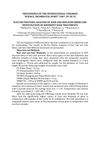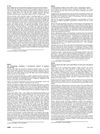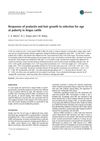
Search
for
Sort by
Research
630-660 / 1000+ results

research Witnessed Trauma Exposure Induces Fear in Mice Through a Reduction in Endogenous Neurosteroid Synthesis
Seeing trauma causes fear in mice by lowering their natural fear-reducing hormones.

research Complicated Trichotillomania of a Trichobezoar: A Clinical Case
Trichotillomania can cause severe complications like hairballs in the stomach, needing surgery and psychiatric care.

research Neonatal Allopregnanolone or Finasteride Administration Modifies Hippocampal K+ Cl− Co-Transporter Expression During Early Development in Male Rats
Allopregnanolone increases KCC2 expression in baby male rats' brains, while finasteride doesn't affect it.

research The Clinical Management of Hirsutism
The document concludes that managing hirsutism involves identifying the cause, using a scoring system for severity, combining cosmetic and medical treatments, encouraging weight loss, and providing psychological support, while noting the need for more research on drug treatments.

research Consequences of Steroid-5α-Reductase Deficiency and Inhibition in Vertebrates
Lack or blocking of SRD5a, a key component in hormone creation, can lead to conditions like pseudohermaphrodism and affect hair growth, bone mass, muscle strength, and reproductive health. More research is needed on its regulation from fertilization to adulthood.

research Protective Effects of Ecklonia Cava Extract on the Toxicity and Oxidative Stress Induced by Hair Dye in In-Vitro and In-Vivo Models
Ecklonia cava extract can reduce the damage and stress caused by hair dye.

research Cell Surface Receptor Kinase FERONIA Linked to Nutrient Sensor TORC Signaling Controls Root Hair Growth at Low Temperature Linked to Low Nitrate in Arabidopsis Thaliana
A protein called FERONIA helps control root hair growth in response to cold and low nitrogen by activating nutrient-sensing pathways in a plant called Arabidopsis.

research Proceedings of the International Congress 'Science, Information, Spirit' 2007, pp 28-35: Electro Photonic Analysis of Hair and Non-Hair Fibers and Investigation of Different Hair Treatments
Hair properties change under electromagnetic fields and are influenced by individual characteristics and the environment.
research Heavily Hunted Wolves Have Higher Stress and Reproductive Steroids Than Wolves With Lower Hunting Pressure
Heavily hunted wolves have higher stress and reproductive hormone levels.
research Synaptic-Like Vesicles and Candidate Transduction Channels in Mechanosensory Terminals
SLVs help maintain muscle stretch sensitivity and could aid in treating hypertension and muscle spasticity.

research A Volar Skin Excisional Wound Model for In Situ Evaluation of Multiple-Appendage Regeneration and Innervation
The study concluded that the new wound model can be used to evaluate skin regeneration and nerve growth.

research Trichotillomania: Clinical Aspects and Treatment Strategies
Behavior therapy and medications, especially clomipramine, can help reduce hair pulling in people with trichotillomania.
research Hair-Pulling Disorder
New treatments for hair-pulling disorder focus on personalized approaches and combining therapies for better results.

research Psychopharmacological Treatment of Trichotillomania in an Adolescent Case: Significant Improvement with Aripiprazole Augmentation
Adding aripiprazole to the treatment improved hair-pulling symptoms in a teenager.

research Study Design for the Stanford Dermatology Personal Genomics Project
The project aimed to understand how genetic test results affect patients' actions and feelings in dermatology.

research Forecasting Phase 3 Dose-Response for Abrocitinib, an Oral Janus Kinase 1 Selective Inhibitor, Using Investigator’s Global Assessment and Eczema Area and Severity Index
Abrocitinib at 100 mg and 200 mg daily may significantly improve moderate-to-severe atopic dermatitis in patients 12 years and older.

research Managing Polycystic Ovary Syndrome: A Cognitive Behavioral Strategy
Cognitive behavioral strategies help women with PCOS make lifestyle changes to improve their health.

research Responses of Prolactin and Hair Growth to Selection for Age at Puberty in Angus Cattle
Selecting Angus cattle for earlier puberty lowers prolactin levels but doesn't affect hair growth.

research Pro-Insulin-Like Growth Factor-II Ameliorates Age-Related Inefficient Regenerative Response by Orchestrating Self-Reinforcement Mechanism of Muscle Regeneration
Pro-IGF-II improves muscle repair in old mice.

research Mental, Behavioral, and Physical Effects of Power-Enhancing Drugs in Chronic Users
Power-enhancing drugs can cause mood swings, aggression, anxiety, and physical side effects, questioning their overall benefits.

research Cognitive, Emotional, Physical, and Behavioral Stress-Related Symptoms and Coping Strategies Among University Students During the Third Wave of COVID-19 Pandemic
University students in Egypt experienced high stress during COVID-19's third wave, with negative coping mechanisms being more common.
research Behavioral Characterization of Vitamin D Receptor Knockout Mice
Vitamin D receptor knockout mice have significant motor impairments but no cognitive deficits.
research The Effectiveness of Behavioral Therapy Versus Medicines When Treating Trichotillomania
Behavioral therapies are more effective than drugs for treating trichotillomania.

research Diagnosis and Management of Alopecia in Children
The guide explains how to identify and treat children's hair loss, including fungal infections, autoimmune disorders, hairstyle changes, self-correcting conditions, and behavioral therapy for hair-pulling.

research Visual Diagnosis: The Case of the Balding Preschooler
A 4-year-old girl with hair loss was diagnosed with early-onset trichotillomania and improved with behavioral interventions.

research Trichotillomania – Therapeutic Possibilities
Cognitive-behavioral therapy with habit reversal training is the most effective treatment for trichotillomania.
research Influence of Age and Testosterone on the Response of Male Rats to Parachlorophenylalanine
PCPA induces hypersexual behavior in male rats regardless of age or castration status.

research Alopecia Areata: Hyperactivity of the Hypothalamic–Pituitary–Adrenal Axis Is a Myth?
The study found no significant difference in stress hormone levels between people with alopecia areata and healthy individuals, suggesting that the disease is not caused by an overactive stress response system.

research Adverse Effects of Opioid Analgesic Drugs
Opioid painkillers can cause many side effects, including breathing problems and addiction, but are generally considered safe when used properly.